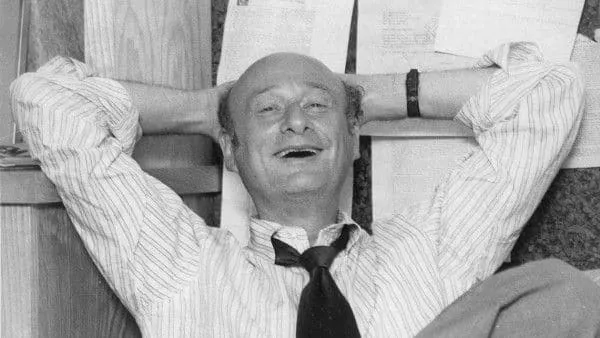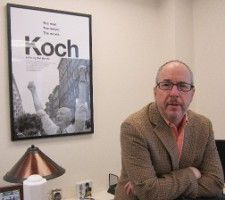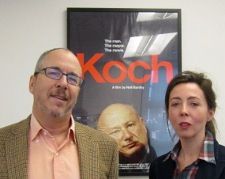 |
| Former Mayor of New York City Ed Koch, "I never felt like I could manipulate him, I always felt he was manipulating us." |
In Neil Barsky's beautifully edited engrossing portrait, Koch, we get to see the many facets of former Mayor Koch's political career and glimpse a private man with strong convictions.
"Gosh, when I grow up, I hope to be Ed Koch," we hear New York City Mayor Michael Bloomberg gush in 2010, at a Gracie Mansion renaming ceremony for Koch, the bridge. Former Parks Commissioner Henry Stern recalls the summer of 64 in Mississippi and Koch's Chief of Staff Diane Mulcahy Coffey remembers a convincing note from her mother, scribbled on an early New York Times article, "This man is a comer!" Journalists give details on Koch's first mayoral campaign: Michael Powell explains how Koch "checkmated Mario Cuomo", Wayne Barrett adds, "It was a stroke of genius. It was also extraordinarily deceptive", and Julie Purnick emphasises the importance of a former Miss America, "she was a good friend to have in that situation".

On Lincoln's birthday, I met with Barsky in his office to talk about Koch the man and Koch the film. The ex-mayor, who died the day the film opened in New York, smiles from the poster versions for the movie on every wall in the office. The documentary combines footage of the different stages in Koch's career with recent interviews that give insight into a full, complicated life in the public eye.
Anne-Katrin Titze: The timing of the opening day of your documentary coinciding with former Mayor Ed Koch's death (at 88 years old, on February 1, 2013) has been much discussed.
Neil Barsky: I don't think it was to the film's advantage. Had he been alive, he'd be the best publicist in the world. He would have been on Jon Stewart (The Daily Show) and you would be sitting in his office now and I would be picking up the scraps. But he was such a good interview and he was always available. He got us a lot of attention.
AKT: Did he ever write that five-star review of your film?
NB: No. I don't even know if he was going to give it five stars. He had some issues with the film although he liked it. He was a very funny man, great sense of humour. But as a film critic, he wasn't a funny writer. It [the review] was going to be for the [New York] Post and they wanted it to be funny. Two or three weeks before, he was in the hospital, so he wasn't in any shape.
AKT: The screening at the Film Society was his last public appearance, no?
NB: At Lincoln Center, that Sunday (January 13). Yes, that was the last time I saw him. He had a date right after, so he spoke and then just left. You saw yourself, his mind was very sharp, very apt. Part of the film is to show this octogenarian, and what an amazing life he was leading.
AKT: You made the decision to make the film mostly about New York. It is as much about the city as it is about the man.
 |
| "We made the movie I wanted to make,"Neil Barsky |
NB: Oh, sure. We had to make choices. We couldn't deal with every issue. We didn't deal with the arts, with education. We barely dealt with crime. And we wanted to deal with things in an intelligent, sophisticated way. So you have to spend some time. So we chose race relations, housing, AIDS, sexual identity, and those we dealt with a lot, as opposed to dealing with 10 things spread out.
AKT: The editing is very tight. I like your decision to use the City Council members to introduce him and the issues to come.
NB: Well, I give a lot of credit to my editor Juliet Weber. We shot pretty efficiently, mostly over six to eight months in the fall of 2010 into 2011. This is my first film but I was a newspaper reporter, a long time ago. I'm comfortable with research and interviewing. Editing is a whole other story. And telling a story with interviews and archival and verité, I couldn't begin to know how to do that. Juliet looked at everything we shot and said there were two narratives. You have a biographical story here, a 2010 story. So she said, put the council in. You are very right, that was purely for biography. If you don't know who Ed Koch is, you'll know he's the mayor, he's a veteran, the housing… And then this guy comes up (City Council member Charles Barron) and says: "Are you kidding me? In the black community he was our nemesis."
AKT: You got a lot of footage with Koch in cars.
NB: Yes, well, that's where he was. There were two ways to interview him. One-on-one, which we did a lot, and in a car. I felt a lot more relaxed in a car. He was a lot less in control. He's been interviewed for more than 50 years, thousands of times. He knows what he's doing. So in a car, it was just a little more relaxed and natural. He was very able to ignore me and ignore the camera. In the one-on-ones, I felt he was more in control, careful. And I never felt like I could manipulate him, I always felt he was manipulating us. And he was a little looser in a car.
AKT: Director Abbas Kiarostami said that it's the best place to film the truth, in cars.
NB: Really? That's funny. You know when you get the least truth? Eating. We filmed a couple of meals and it's very hard to get some kind of flow. We filmed two lunches and we had one little scene, when he talks about (President) Reagan that we got out of it.
AKT: You show him making breakfast in his apartment. I was surprised how much access he gave you. He allowed you to film his medications, the whole pill tray.
NB: Yes, we had a good DP (Tom Hurwitz). Koch was a little reluctant to do that scene. I think he thought we wanted to see him in his pyjamas brushing his teeth, which would have been fine. He was sensitive that he was not depicted as a vulnerable old guy. There were two scenes that he took issue with, two things. One was race. He felt we were too tough on him with respect to race relations. Okay, that's fine, you know. The other thing he minded, and he never said this to me, but I read it in interviews he gave. The scene where he is walking home by himself at the end of the night. We showed him in every way - with his family, with his friends. But it was important to show that unlike many of us he went home alone every night. Not that he was lonely but that he was alone.
AKT: In my review of Koch I called it his Zero Dark Thirty moment. When you show him standing there all alone, like Jessica Chastain at the end of the movie.
NB: Oh, right, because she is such a loner. And he is looking down at his shoes.
AKT: I used to see him in the audience for some eclectic screenings. I remember seeing him opening weekend at Cinema Village of a Catherine Breillat film. Did you talk about movies with him?

NB: Really? No. All he really likes to talk is politics. If he was alone, he wanted to talk about himself or politics. If he was with his friends or family, they talked politics. He grew to be very accustomed to being the center of attention. He was not selfish but he had a very hard time losing sight of himself.
AKT: Tell me about your selection of music. I was reminded of The French Connection (William Friedkin's 1971 film) at times.
NB: Seventies and Eighties. Talking Heads, thump, thump, thump, thump, Disco. Simon and Garfunkel. That's just my taste. But then we had a lot of composed music. Again, I'm learning how that works.
AKT: The placement was carefully done.
NB: Well, you need people who have a good sense of aesthetics. It may not always be the director. I can tell you the truth. We made the movie I wanted to make. I wanted to make a political film about how New York came back. Tied to this, I wanted to recreate the 80s. I wanted to show this guy's career as being really the important turning point in New York's history. And I wanted to show this very complex, likable, exasperating 86-year-old ex-mayor.
AKT: When did you first have the idea to make this film?
NB: I used to manage a hedge fund and I retired in 2009. I taught a course at college in economics at Oberlin and eventually decided that I wanted to sort of return to journalism in some way. I used to be a newspaper reporter for the (New York) Daily News and the Wall Street Journal, went to finance from 93 to 2009. As you know, the whole media world is imploding. Everything is being fragmented and no one medium has the sort of impact that it used to. I realised there actually is one form of journalism where the impact has been heightened in the last 20 years and that's documentary film. I think the best documentaries are those where things unfold before your eyes in honest unpredictable ways… I eventually decided that he [Koch] would make a great character and this story was a great story, the story of New York. It was about May or June of 2010 and I approached Diane Coffey, who was his Chief of Staff, then we met Ed and within ten minutes he said 'let's do it.' And there were no stipulations, no controls, no agreement except to show him a cut before we locked. He said he was going to take a reel into his grave.
AKT: Death was present for him?
NB: He was always very conscious of his mortality. One of his friends told me that he was relieved when he saw the film because he was concerned that he'd die before the film came out and then we would bury him effectively and this would be his legacy.
AKT: Seeing him at the Lincoln Center screening that day, he was completely present. His mind sharp as ever.
NB: I spoke with him two days before he died and I would say he sounded weaker but very sharp, as always. It's interesting because a lot of us say, oh, we don't want to lose our mind when we go. But when you're so lucid, it's a peculiar kind of realisation. Because he knew what his medical condition was… He's so at ease talking about his own death, it's bizarre. I'm not, I'm terrified of dying. Period.
AKT: Well, you're not 88 years old. Tell me about recent documentaries you liked.
NB: The ones I liked recently are not necessarily political. I thought the one with Ginger Baker (Beware Of Mr Baker, directed by Jay Bulger), the drummer, is fabulous. It's a crazy man in all his splendor unprotected, acting crazy. Great archival, great music. I loved the Valentino movie, The Last Emperor (directed by Matt Tyrnauer), because, as I said, things unfold before your eyes. And these guys, like Valentino or Koch, they try to protect their image so much but in the course of protecting, they reveal.
Neil Barsky and his team have assembled an impressive collection of voices to give us a revealing study of one of New York's inextinguishable stars.
"He was very comfortable saying no and it was a word that most New Yorkers hadn't heard before", says Michael Goodwin, co-author of I, Koch in the film and Calvin O. Butts III, Pastor of the Abyssinian Baptist Church after commenting on the other mayors in his lifetime, echos the old Highlander tagline that there can only be one, and that's Koch: "He's the Mayor."
Koch is currently on limited release in the US. It opens in LA on March 1. For more information about venues and times, visit the official site





















